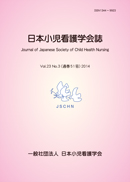Volume 21, Issue 2
Displaying 1-10 of 10 articles from this issue
- |<
- <
- 1
- >
- >|
-
Article type: Article
2012Volume 21Issue 2 Pages 1-8
Published: July 20, 2012
Released on J-STAGE: March 27, 2017
Download PDF (4008K) -
Article type: Article
2012Volume 21Issue 2 Pages 9-16
Published: July 20, 2012
Released on J-STAGE: March 27, 2017
Download PDF (915K) -
Article type: Article
2012Volume 21Issue 2 Pages 17-24
Published: July 20, 2012
Released on J-STAGE: March 27, 2017
Download PDF (985K) -
Article type: Article
2012Volume 21Issue 2 Pages 25-32
Published: July 20, 2012
Released on J-STAGE: March 27, 2017
Download PDF (953K) -
Article type: Article
2012Volume 21Issue 2 Pages 33-40
Published: July 20, 2012
Released on J-STAGE: March 27, 2017
Download PDF (1115K) -
An Appraisal of the Satisfaction of Parents of the Nursing Care During Their Child's Cardiac SurgeryArticle type: Article
2012Volume 21Issue 2 Pages 41-48
Published: July 20, 2012
Released on J-STAGE: March 27, 2017
Download PDF (903K) -
Article type: Article
2012Volume 21Issue 2 Pages 49-54
Published: July 20, 2012
Released on J-STAGE: March 27, 2017
Download PDF (1090K) -
Article type: Article
2012Volume 21Issue 2 Pages 55-63
Published: July 20, 2012
Released on J-STAGE: March 27, 2017
Download PDF (1159K) -
Article type: Article
2012Volume 21Issue 2 Pages 64-71
Published: July 20, 2012
Released on J-STAGE: March 27, 2017
Download PDF (981K) -
Article type: Appendix
2012Volume 21Issue 2 Pages App4-
Published: July 20, 2012
Released on J-STAGE: March 27, 2017
Download PDF (84K)
- |<
- <
- 1
- >
- >|
